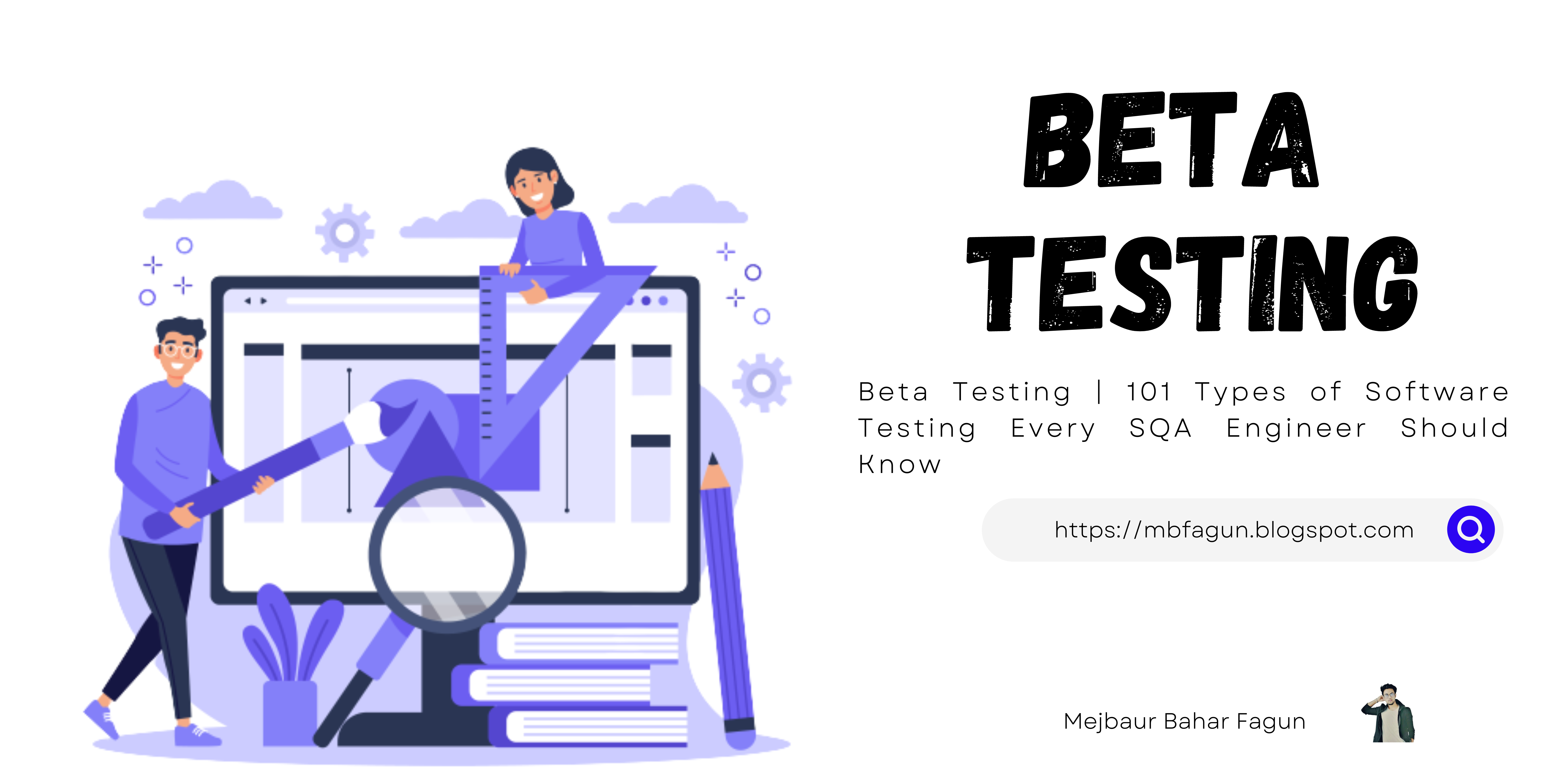Beta Testing | 101 Types of Software Testing Every SQA Engineer Should Know 🧪🕵️♂️
 Mejbaur Bahar Fagun
Mejbaur Bahar Fagun
Welcome to our comprehensive blog series, “101 Types of Software Testing Every SQA Engineer Should Know.” In this instalment, we delve into the world of Beta Testing, a critical phase in software testing that holds immense significance for SQA (Software Quality Assurance) engineers and software testers alike.
Beta Testing: A Crucial Step in the Testing Process
Beta testing, also known as user acceptance testing (UAT), is an essential phase in the software development lifecycle (SDLC). It comes after alpha testing and before the final release of a product. This article will provide SQA engineers and software testers with insights into the nuances of beta testing, its importance, and best practices to conduct it effectively.
What Is Beta Testing?
Beta testing is the process of releasing a near-complete version of a software product to a select group of external users or customers. These users, known as beta testers, are real-world end-users who provide valuable feedback on the software’s functionality, usability, and overall user experience. The primary goal of beta testing is to identify any issues, gather user feedback, and make necessary improvements before the software is officially launched to a wider audience.
Key Objectives of Beta Testing for SQA Engineers and Software Testers
Quality Assurance: Beta testing helps SQA engineers and testers identify any hidden defects or issues that may not have been discovered during the earlier phases of testing. This ensures that the final product is of high quality and meets user expectations.
Usability Testing: Beta testers evaluate the software’s user-friendliness, making it an essential phase for improving the user interface (UI) and user experience (UX). SQA engineers can gain insights into how users interact with the software.
Feedback Gathering: Beta testing is a valuable source of feedback from real users. SQA engineers and testers can use this feedback to prioritize and address critical issues and make data-driven decisions for further development.
Stress Testing: Beta testing allows for testing the software under real-world conditions with a diverse user base. This helps identify performance bottlenecks and scalability issues, ensuring that the software can handle increased loads.
Market Validation: Beta testing provides an opportunity to gauge market acceptance and demand for the product. It helps in understanding whether the software aligns with users’ needs and expectations.
Best Practices for Beta Testing
Selecting the Right Beta Testers: Carefully choose beta testers who represent your target audience. Diversity in the tester group can provide valuable insights into different user perspectives.
Define Clear Objectives: Set specific goals and objectives for the beta testing phase to ensure that the testing process remains focused and productive.
Feedback Collection: Provide beta testers with clear instructions for reporting issues and feedback. Utilize tools and platforms to streamline the feedback collection process.
Continuous Communication: Maintain open lines of communication with beta testers. Regularly update them on the status of reported issues and keep them engaged throughout the testing phase.
Version Control: Keep track of different software versions distributed to beta testers. This helps in identifying the impact of changes and improvements.
Data Security: Ensure that sensitive user data is protected and that the software complies with privacy regulations.
Conclusion
Beta testing is a pivotal phase in the software testing process, offering SQA engineers and software testers a unique opportunity to fine-tune and improve a software product based on real user feedback. By conducting effective beta testing, organizations can increase the chances of launching a high-quality, user-friendly, and successful software product.
In our “101 Types of Software Testing Every SQA Engineer Should Know” series, we will continue to explore various aspects of software testing, equipping you with the knowledge and tools needed to excel in your role as a software tester or SQA engineer. Stay tuned for more insights into the world of software testing!
📢 Get Free SQA & Cyber Security Articles: https://mbfagun.blogspot.com/
👉 Learn Software Testing / SQA: https://mbfagun.blogspot.com/p/sqa.html
👉 Learn Cyber Security & Ethical Hacking: https://mbfagun.blogspot.com/p/cyber-security.html
😎 Solve Try to Hack Me Room: Security Testing for SQA tryhackme.com/jr/securitytestingforsqa
😎 Solve Try to Hack Me Room: SQA life of Bugs 🐞tryhackme.com/jr/sqathebug
🥸 Submit Your Question & Get Answer: https://faq-mbfagun.blogspot.com/
#BetaTesting #SoftwareTesting #QualityAssurance #UserExperience #SQAEngineers #SoftwareTesters #TestingProcess #UAT #SoftwareQuality #TestersCommunity #QA #TestAutomation #BugHunting #FeedbackLoop #AlphaVsBeta #TestAndImprove #SoftwareDevelopment #TestingPhase #UserFeedback #UsabilityTesting #QAInsights #ReleaseTesting #BetaTesters #mejbaurbaharfagun #sqa #softwaretesting #betatesting #alphatesting #typesofsoftwaretesting
Subscribe to my newsletter
Read articles from Mejbaur Bahar Fagun directly inside your inbox. Subscribe to the newsletter, and don't miss out.
Written by

Mejbaur Bahar Fagun
Mejbaur Bahar Fagun
With a strong background in both Software QA Engineering and Certified Ethical Hacking, I bring a unique and comprehensive skill set to my work. My expertise in manual and automated testing, along with my ability to design effective test frameworks from scratch, makes me a valuable asset to any software development team. My familiarity with both the Waterfall and Scrum methodologies of the SDLC ensure that I can operate seamlessly within any development process. I have a proven track record of effectively verifying software products, conducting thorough online form factor validations, and verifying complex algorithm designs through the use of Matlab scripts. Let me bring my technical expertise and commitment to ethical practices to your next project.